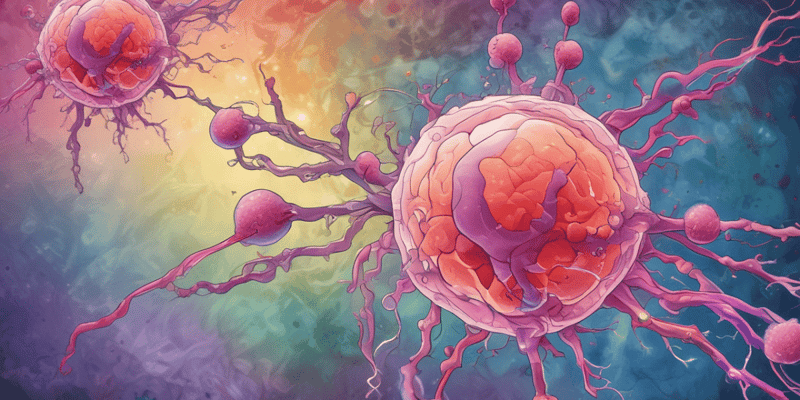31 Questions
What is the result of a gene amplification mechanism?
Excessive production of a normal protein
What is the primary cause of genetic damage that leads to cancer?
Tumor-promoting chemicals, hormones, and viruses
What is the effect of a point mutation in a proto-oncogene?
Production of a hyperactive protein
What is the characteristic of cancer cells regarding apoptosis?
They are resistant to apoptosis
What is the role of protooncogenes in normal cells?
They promote cell growth
What is the result of oncogenic mutations in protooncogenes?
Increased gene expression or production of a hyperactive gene product
What is the result of a chromosomal rearrangement mechanism?
Fusion of a proto-oncogene to an actively transcribed gene
What is the effect of a loss of function mutation in a tumor-suppressor gene?
Loss of normal growth regulation
What is the role of tumor-suppressor genes in normal cells?
They restrain cell growth
What is the main characteristic of tumors that allows them to grow beyond a small size?
Ability to induce growth of blood vessels
What happens when genome maintenance genes are inactivated?
Cells acquire additional genetic changes at an increased rate
What is the role of p53 in response to DNA damage?
It induces apoptosis if the damage is unrepairable
What is a characteristic of cancer cells that distinguishes them from normal cells?
They are not sensitive to density dependent inhibition of cell proliferation
What is the term for the state of being oxygen-starved, which is characteristic of tumors?
Hypoxia
What is the term for the massive proliferation of leukemic cells that can cause a patient's blood to appear milky?
Leukemia
What do normal cells in culture display when they reach a finite cell density?
Density dependent inhibition of cell proliferation
What is a characteristic of cancer cells that allows them to invade surrounding tissues?
Abnormal organ function
What is the approximate number of cancer deaths per 100,000 people worldwide each year?
100-350
What is the primary reason for cancer development?
Failures of mechanisms regulating cell growth and proliferation
Which of the following cell types has a lifespan of only 2-4 weeks?
Skin cells
What happens to intestinal epithelial cells after a few days?
They are replaced by new cells
Which of the following is NOT a characteristic of stable cells?
They can divide continuously throughout life
What is the result of the malfunction of mechanisms that maintain normal proliferation rates?
Excess cell division
What is the primary function of angiogenesis in tumor development?
To supply oxygen and nutrients to proliferating tumor cells
What is the characteristic of normal cells in culture?
They enter a resting state after 50 divisions and die
What is the result of defective differentiation in cancer cells?
Active proliferation
What is the characteristic of leukemic cells?
They retain the capacity for proliferation
What is the difference between a benign tumor and a malignant tumor?
Benign tumors are non-invasive, while malignant tumors are invasive
What is the result of a single mutation in a cell?
It is not enough to cause cancer
What is the characteristic of cancer cells?
They are immortal and fail to undergo apoptosis
What is the role of VEGF in tumor development?
It promotes angiogenesis
Study Notes
Cancer Characteristics
- Cancer causes approximately one-fifth of the deaths in the US each year, with a global mortality rate of 100-350 per 100,000 people annually.
Cell Proliferation
- Normal cell growth and development are regulated by intricate genetic control systems, balancing cell birth and cell death rates.
- Some adult tissues, such as intestinal epithelial cells, white blood cells, and skin cells, undergo continuous proliferation and replacement.
- Other adult tissues, like hepatocytes, heart muscle cells, and neurons, do not proliferate except during healing processes.
Cancer Development
- Cancer occurs when mechanisms regulating normal proliferation rates malfunction, leading to excess cell division.
- Genetic damage, often caused by tumor-promoting chemicals, hormones, and viruses, results in the loss of cellular regulation.
- Three broad classes of genes are implicated in cancer onset: protooncogenes, tumor-suppressor genes, and genome maintenance genes.
Gene Mutations
- Protooncogenes promote cell growth; mutations convert them into oncogenes, leading to excessive growth promotion.
- Tumor-suppressor genes restrain growth; mutations inactivate them, allowing inappropriate cell division.
- Genome maintenance genes maintain genome integrity; inactivation leads to increased genetic changes, including mutations that cause cancer.
Tumor Characteristics
- Most tumors are solid masses, but leukemias grow as individual cells in the blood.
- Tumors are characteristically hypoxic, requiring a blood supply to grow beyond a small size.
- Cancer cells promote angiogenesis, secreting growth factors to form new blood vessels.
Properties of Cancer Cells
- Uncontrolled cell division, ignoring density-dependent inhibition of cell proliferation.
- Immortal cell life, failing to undergo apoptosis and exhibiting increased life spans.
- Failure to differentiate normally, stuck in an early stage of differentiation.
Genetic Basis of Cancer
- Cancers result from somatic mutations, which are nonlethal genetic damages.
- A single mutation is not enough to cause cancer; genetic instability is a hallmark of cancer cells.
- Mechanisms that convert a proto-oncogene into an oncogene include deletion, point mutation, gene amplification, and chromosomal rearrangement.
This quiz covers the characteristics of cancer, including its causes, death rates, and effects on cell growth and proliferation. It is based on a lecture by Assoc. Prof. Özlem KURNAZ GÖMLEKSİZ from the Department of Medical Biology.
Make Your Own Quizzes and Flashcards
Convert your notes into interactive study material.
Get started for free



